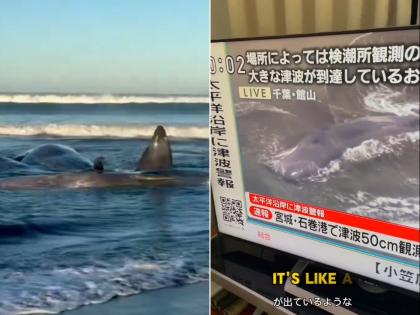Whales Washed Ashore in Japan After Tsunami Hits Island Nation; Videos Surface
By Lokmat English Desk | Updated: July 30, 2025 13:14 IST2025-07-30T13:09:36+5:302025-07-30T13:14:15+5:30
Locals uploaded videos on the social media platform X (formerly Twitter) showing huge whales washing up on the surface ...

Whales Washed Ashore in Japan After Tsunami Hits Island Nation; Videos Surface
Locals uploaded videos on the social media platform X (formerly Twitter) showing huge whales washing up on the surface of the shore in Japan after a tsunami hit the island nation. The tsunami was triggered by an earthquake of magnitude 8.8 that struck the Russian coasts in the early hours of Wednesday, July 30.
4 whales washed ashore by the current tsunami in Japan
— Science girl (@gunsnrosesgirl3) July 30, 2025
Hirasuna Chiba July 30, 2025
pic.twitter.com/Jy6yPu52P7
Whales were sighted ashore along the coastline of Tateyama City in Chiba. This unusual incident occurred shortly after the Japanese weather department sounded a tsunami alert across the country. Tsunami waves measuring about 30 centimetres were observed at the Hokkaido coast at around 10.40 am (Japan local time). Authorities issued evacuation warnings for people in the area and asked them to move to safer places. However, no major damage was reported.
Whales washing ashore in Japan pic.twitter.com/GFmzmBUmHT
— Joel Varela (@JoelVarela79) July 30, 2025
The sighting of whales at a shore drew attention, raising questions about the environment and the impact of pollution on earth, including on these mammals. Visuals of them lying along the shore surfaced in international media.
Whales washed ashore in Japan after the tsunami.
— NEXTA (@nexta_tv) July 30, 2025
Local residents are trying to assist the animals. https://t.co/nvAmvpijnCpic.twitter.com/f89lQuHsU1
Local media channels in Japan broadcast live footage of stranded whales along the beach. Videos of the broadcast went viral on social sites, including X. Netizens expressed shock and concern, with many connecting the sight to the tsunami threat.
Marine mammals, including Whales, generally stay near the seabed, where tsunami waves trigger the washup to the shore due to the high currents of water in the ocean. However, as these waves approach shallow coastlines, the water level can suddenly recede, followed by a violent surge forward.
These sudden changes in water currents and water levels can disorient whales, sometimes trapping them near shorelines. According to marine experts, chaotic oceans can cause whales to face difficulties finding their way. Sometimes, they lose their navigation or become temporarily stranded, leading to their washing up on the sea beaches.
Open in app